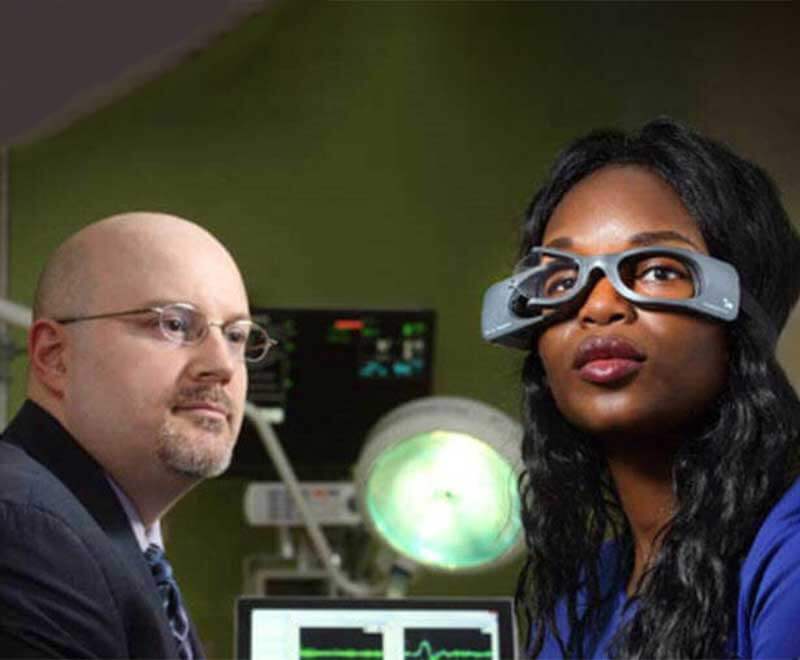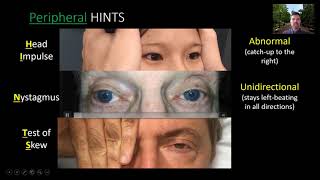Programs and Appointments
Most of our patients are referred by a general neurologist or another specialist when our expertise is needed. Many patients with vision loss, dizziness or vertigo, which are common problems, do not need a specialty consultation with our center. Please ask your current doctor whether they recommend an appointment in our clinic.
We see patients primarily at the Johns Hopkins Outpatient Center.
- Daniel Gold, D.O., is our clinical lead for the division and has clinics for patients with neuro-visual or vestibular disorders.
- Amir Kheradmand, M.D., has a clinic for patients with vestibular disorders.
- Staff technicians perform neuro-visual and vestibular function tests.
Appointments and Referrals
To schedule an appointment or refer a patient, please call 410-955-9441.
We requests that you or your referring physician forward the following information to us before scheduling an appointment:
- a referral letter about the problem from your physician
- reports of prior neurological or ENT evaluations
- lab reports including ENG (caloric testing) and hearing testing
- reports of any MRI and other radiology testing
- any other significant documents or information
Please submit the above information to our senior medical office coordinator, who will assist in scheduling your appointment:
NVV MOC
Pathology 2-210
600 North Wolfe Street
Baltimore, MD 21287
Fax: 410-614-1746
Phone: 410-955-9313
Email: [email protected]
Once we receive all materials, our team will review the records generally within five business days. Our scheduling department will contact the patient to arrange an appointment and will send a medical history questionnaire and a medication list form to complete before the visit. Please return the completed forms before the appointment at your earliest convenience. We rely on patient records to triage how soon a patient should be seen.
We will advise the patient is a different type of referral or consultation is recommended. Our consultants provide their assessment directly to the patient and make recommendations back to the referring doctor.
Neuro-Ophthalmology Clinic (Neuro-Visual Disorders)
Our clinical faculty and fellows evaluate and treat outpatients with neuro-visual and vestibular disorders.
We see patients with problems related to:
- sudden vision loss
- optic neuritis
- papilledema
- pseudotumor cerebri (idiopathic intracranial hypertension)
- pupils or eyelids
- double vision
- abnormal eye movements or nystagmus
Referrals
If a patient has vision loss, they should be seen first by an ophthalmologist or optometrist at or outside of Johns Hopkins. If a second opinion is needed, the referring provider should call 410-955-9441 and fax records to 410-367-3212 (the faxing of medical records should be accompanied by a call). For abnormal eye movements, no referral is required.
Oto-Neurology Clinic (Vestibular Disorders)
We see patients with problems related to:
- Vertigo
- Dizziness
- Imbalance (unsteadiness when walking due to balance problems)
- Inner ear conditions
- Nystagmus or other intrusive, abnormal eye movements
Patients with known or suspected Menière’s disease, superior canal dehiscence syndrome, acoustic neuroma/vestibular schwannoma or other skull base tumors generally consult with our otolaryngology (ENT) colleagues in the otology division to be assessed for possible surgical treatment.
Referrals
We prefer that all oto-neurology patients are referred by a physician, typically a specialist such as a general neurologist or ENT/otolaryngologist. Direct referrals from the patient’s treating doctors ensure good continuity of care, especially because most of our visits are one-time consultations.
Patients referred directly by their doctors, who provided a referral to evaluate and treat for a specific condition along with appropriate records, will be given priority. Self-referred patients may be directed to seek care with another provider first. On rare occasions, we will see patients who have not seen specialists previously. However, because appointment wait times can be long, we encourage patients to first see a general neurologist or ENT/otolaryngologist for help with their symptoms. If additional expertise is needed, a referral can be made to us.
Pre-screening
Our team screens all patients before providing an appointment date to ensure that patients get seen by the right doctor and that we have all information needed for the appointment. Please fax all materials to 410-367-3212. Referring physicians should fax a consultation request that includes the reason for consultation along with a patient’s name, address, phone number(s) and insurance information. Please also send neurology, ENT and cardiology visit notes related to the condition, as well as any test results such as radiology scan reports (especially brain MRI brain reports).
Learn More About the Science Behind Tele-Dizzy
Tele-(Dizzy) Medicine: From Eye Movements to Diagnosis
Dr. Daniel Gold talks about the different tests to evaluate dizziness and how they are used in the Tele-Dizzy program.


